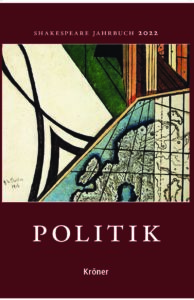Shakespeare Jahrbuch 2022

POLITICS
“Th’ abuse of greatness is when it disjoins remorse from power” – these are Brutus’ words from Julius Caesar about the potential abuse of political power. ‘Politics’ is a central topic in Shakespeare’s works, which have recurrently been used for the reflection of political questions. For Andreas Mahler, the Shakespearean stage is a place of politics and aesthetics; while it forms part of the polis, it simultaneously puts this polis on display and explores it. In early modern England, Shakespeare’s plays negotiate new models of political rule, but they are also concerned with the fear of tyranny and rebellions. Chris Fitter concentrates on those moments in which Shakespeare’s rulers directly address the audience in order to reflect on the power of the state. Other articles are concerned with individual Shakespearean texts or their reception: Ingrid Benecke questions the assumption that Macbeth was written to please King James, and illustrates the political implications of the Banquo figure. Mythili Kaul focuses on Henry VIII and shows that despite the play’s distinct parallels to the romances, it offers – other than the romances – a fundamental challenge of political authority. Honor Jackson argues that after the restauration of the monarchy, Dryden and Davenant’s The Tempest, or The Enchanted Island (1667) develops a new perspective on the utopian moments in The Tempest. Aleida Auld shifts the focus to Shakespeare’s narrative poems whose inclusion in Poems on Affair of State (1707) turned out to be crucial for the political poetry of the eighteenth century. Shakespeare’s role for the community is at the centre of Ewan Fernie’s contribution, which discusses George Dawson’s ‘civic gospel’ for nineteenth-century Birmingham, inspired by Shakespeare. Shakespeare’s plays have also been adapted in political conflicts of the present, as Miriam Leung-che Lau illustrates in her discussion of Tang Shu-wing’s recent Macbeth productions in Hong Kong.
Isabel Karremann and Sabine Schülting
Table of contents
Articles: Politics
Mentoring the Politics of Commoners: Shakespeare’s Hidden Art of Deixis (CHRIS FITTER)
Verhandlungen des Imaginären: Politik und Ästhetik in Shakespeares Historien (ANDREAS MAHLER)
Shakespeare, Macbeth and the Stuart Myth of Banquo (Ingrid Benecke)
What Is True? – Henry VIII and the Romances (MYTHILI KAUL)
Politics, Parody and Patriarchy: Adapting Utopia in John Dryden and William Davenant’s The Tempest or, The Enchanted Island (1667) (HONOR JACKSON)
Shakespeare’s Narrative Poems in Poems on Affairs of State (1707): Politics, Authorship and Literary History (ALEIDA AULD)
Shakespearean City (EWAN FERNIE)
Adapting Shakespeare in Hong Kong: Tang Shu-wing’s Macbeth in 2016 and 2019 (Miriam Leung-che Lau)
Miscellanea
Informationssicherheit versus Wissenschaftsdynamik: 50 Jahre Shakespeare-Handbuch (INA SCHABERT)
Vom Drama zum Roman: Ein Werkstattbericht. Adaptionen von The Winter’s Tale: Verraten und Verkauft und Love’s Labour’s Lost: Plaisir d’Amour (PETER KLEINE)
Theatre Reviews
Shakespeare on the German Stages 2020/2021
(Edited by Felix Sprang)
Lockdown Love: Shakespeare auf Distanz in NRW (SARAH BRIEST, MARVIN KRUSE, JAN MOSCH, SARA TUCKWELL, ROLAND WEIDLE UND JAN WILLING)
Von Schwergewicht zu Leichtigkeit: Shakespeare post-Corona-Lockdown im Südwesten (KATRIN BECKER, SOPHIE MUCENIEKS UND FELIX SPRANG)
Verzeichnis der Shakespeare-Inszenierungen der Spielzeit 2020/21 (BETTINA BOECKER UND MARIETTA WENNING)
Book Reviews
(Edited by Susanne Gruß and Lena Steveker)
Amy Cook, Shakespearean Futures: Casting the Bodies of Tomorrow on Shakespeare’s Stages Today; Peter Kirwan, Shakespeare in the Theatre: Cheek by Jowl; Harry R. McCarthy, Performing Early Modern Drama Beyond Shakespeare: Edward’s Boys (ISABEL KARREMANN)
Peter Kirwan and Kathryn Prince eds, The Arden Research Handbook of Shakespeare and Contemporary Performance (Gemma Kate Allred)
Pascale Aebischer, Shakespeare, Spectatorship and the Technologies of Performance; W. B. Worthen, Shakespeare, Technicity, Theatre (Heidi Lucja Liedke)
Dennis Austin Britton and Melissa Walter eds, Rethinking Shakespeare Source Study: Audiences, Authors, and Digital Technologies (KIRSTEN SANDROCK)
Lucy Munro, Shakespeare in the Theatre: The King’s Men (Pavel Drábek)
- A. Katritzky and Pavel Drábek eds, Transnational Connections in Early Modern Theatre (DAVID AMELANG)
Penelope Geng, Communal Justice in Shakespeare’s England: Drama, Law, and Emotion; Stephanie Elsky, Custom, Common Law, and the Constitution of English Renaissance Literature (Franziska Quabeck)
Kate Aughterson and Ailsa Grant Ferguson, Shakespeare and Gender: Sex and Sexuality in Shakespeare’s Drama (Marlena Tronicke)
Ariane M. Balizet, Shakespeare and Girls’ Studies (Christina Wald)
Curtis Perry, Shakespeare and Senecan Tragedy (Kilian Schindler)
Sophie Duncan, Shakespeare’s Props: Memory and Cognition (Marcus Hartner)
David McInnis, Shakespeare and Lost Plays: Reimagining Drama in Early Modern England (Darren Freebury-Jones)
Faith D. Acker, First Readers of Shakespeare’s Sonnets, 1590–1790 (JOHN ROE)
Jane Kingsley-Smith, The Afterlife of Shakespeare’s Sonnets (MANFRED PFISTER)
Callan Davies, Strangeness in Jacobean Drama (JOACHIM FRENK)
Wieland Schwanebeck, Literary Twinship from Shakespeare to the Age of Cloning (Roland Weidle)
Reports
Tätigkeitsbericht der Präsidentin (Herbst 2021) (Claudia Olk)
“Shakespeare und Politik”: Jahrestagung in Weimar, 12. – 14. November 2021 (Jonas Kellermann)
“King Richard II: Staging Politics in/with Shakespeare”: Shakespeare Academy in Weimar, 11. – 14. November 2021 (Elena Catherine Natroshvili)
Obituaries
Wilhelm Hortmann (1929–2021)
Zum Gedenken an Markus Marti (1955–2021)
Index
Notes on Contributors
Martin-Lehnert-Prize


